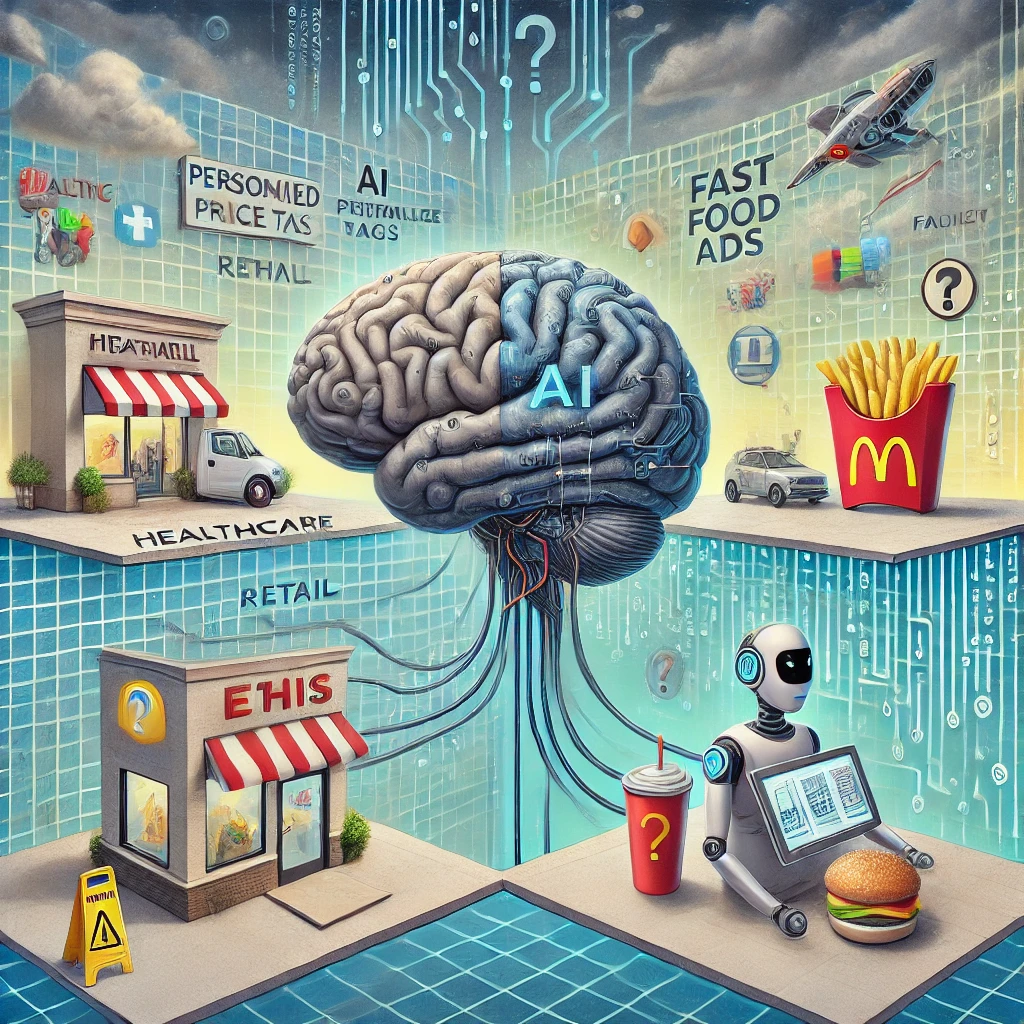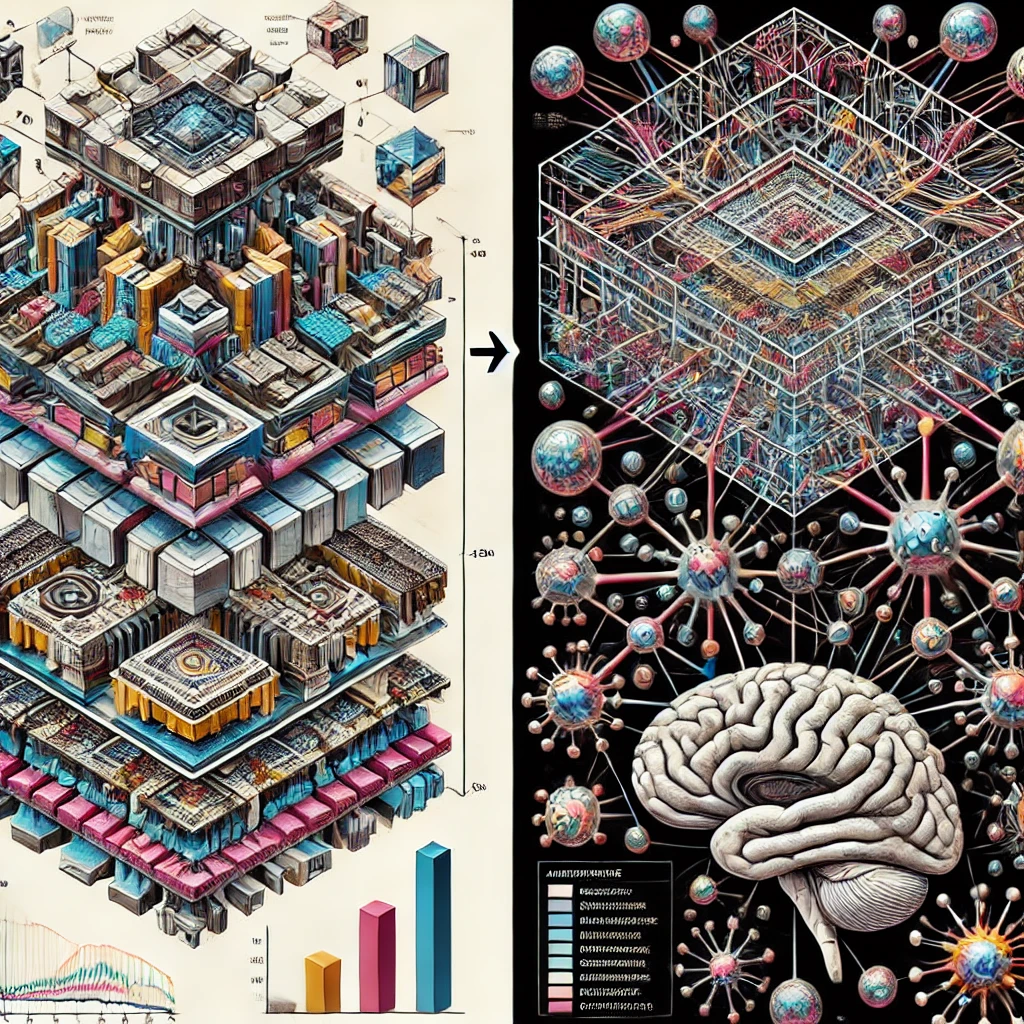
AI Ethics: Unseen Challenges Across Industries
| June 24, 2024
In a gleaming Silicon Valley conference room, engineers celebrate as their AI outperforms human experts in diagnosing a rare form of cancer. Meanwhile, at a Chicago McDonald’s, an AI-driven voice ordering system steps into a minefield of labor law violations, as reported by Forbes. In a bustling hospital, administrators halt ambitious AI implementation plans due to concerns over the system’s readiness for healthcare complexities, highlighted in an MSN article. A retail CEO grapples with the unseen ethical implications of their new AI-driven personalization engine, explored by Big Data Quarterly.
These scenes, unfolding across sectors, encapsulate the promise and perils of artificial intelligence in 2023. As AI reshapes industries, it becomes clear that the ethical implications of these technologies are complex and far-reaching.
While AI brings breakthroughs and improvements, it also introduces a myriad of ethical challenges requiring proactive consideration and action. Organizations must navigate this landscape responsibly to harness AI’s full potential while safeguarding individual and societal well-being. Let us explore some pressing ethical dilemmas associated with AI across various industries:
The Retail Dilemma: Personalization vs. Privacy
In retail, AI enables unprecedented personalization through tailored recommendations and targeted marketing. However, this raises significant privacy concerns and risks perpetuating biases, such as digital redlining. Retailers must adopt transparent practices and prioritize ethical AI system design to mitigate these risks.
In the retail sector, AI has transformed customer engagement through personalized recommendations, pricing, and marketing. However, it comes with ethical concerns. Retailers using AI for personalized pricing may inadvertently discriminate, such as charging higher prices to customers from lower-income neighborhoods, a practice known as digital redlining. Moreover, the extensive personal data required for AI-driven personalization raises serious privacy concerns. Consumers must question where personalization crosses the line into privacy invasion and how AI systems could manipulate consumer behavior to prioritize corporate profits over individual agency. Retailers should adopt transparent practices, address potential biases in AI algorithms, and protect consumer privacy to balance personalization with ethical considerations.
The Healthcare Hurdle: Promise vs. Preparedness
AI holds immense promise in healthcare, with potential applications in early disease detection and personalized treatment plans. However, as highlighted in a recent MSN article, the healthcare system may not be ready for widespread AI adoption due to ethical challenges. Complex medical decision-making, critical patient privacy concerns, and potential biases in AI systems trained on historical data are some of the significant ethical hurdles. AI systems could inadvertently perpetuate existing health disparities if these biases aren’t addressed during development. Additionally, the “black box” nature of many AI algorithms poses a unique challenge in healthcare. Trusting AI-driven recommendations without understanding how they were reached can have serious implications for patient trust and medical liability. To overcome these challenges, healthcare organizations must balance the benefits of AI with fairness, ensure AI decision explainability, and adhere to strict privacy standards. By proactively addressing these ethical considerations, the healthcare sector can harness AI’s potential while safeguarding patient well-being and maintaining trust in medical decision-making.
The Fast Food Fiasco: Efficiency vs. Employment
The recent incident at McDonald’s, where an AI-driven voice ordering system potentially violated labor laws, underscores another critical ethical challenge: the impact of AI on employment and worker rights. While AI can improve efficiency and reduce costs, we must thoughtfully navigate the potential consequences for human workers. As AI systems become more adept at performing tasks traditionally done by humans, we must balance the pursuit of efficiency with the need to protect jobs and worker rights. Moreover, we must ensure that AI system implementations don’t unintentionally infringe on labor laws or create unjust working conditions. To address these challenges, companies must engage in open dialogue about AI’s implications, involve stakeholders in decision-making processes, and ensure compliance with labor laws and fair working conditions. By proactively considering the ethical implications of AI on employment, we can work towards a future where technological advancements benefit businesses and employees alike.
The Way Forward: Proactive Ethical Considerations
The diverse, complex, and often industry-specific ethical challenges posed by AI require a thoughtful and proactive approach. Several common strategies emerge:
- Look Beyond Technical Performance: While technical capabilities are essential, we must prioritize ethical considerations in AI development and deployment.
- Prioritize Transparency and Explainability: As AI systems become more complex, it’s crucial to develop methods to make their decision-making processes transparent and explainable.
- Consider Long-term Societal Impacts: We must look beyond immediate business benefits and consider the long-term impacts of AI on society, including fairness, privacy, and employment.
- Embrace Diverse Perspectives: Involving ethicists, social scientists, and representatives from affected communities in AI development can help identify and address potential ethical issues early on.
- Implement Robust Governance: As AI capabilities advance, we need strong governance frameworks to ensure responsible development and deployment.
The path forward may be challenging, but the rewards—for business, society, and humanity—are immense. By addressing ethical challenges proactively, we can harness AI’s transformative power while safeguarding our values and future.
In the world of AI, innovation and ethics must be partners, not competitors. Our decisions about AI development and deployment will shape society for generations. Let’s make these decisions with care, foresight, and a strong ethical foundation to ensure a responsible and equitable AI future.
Recent Blogs
View All
The AI Research Consortium Revolution
| November 11, 2025

The University AI Commercialization Gap
| August 15, 2025

Scaling Intelligence: Quantum Bits to Global Networks
| August 29, 2024

The Future of Shopping is Now
| July 25, 2024

Navigating the Future of AI and Society
| July 24, 2024

